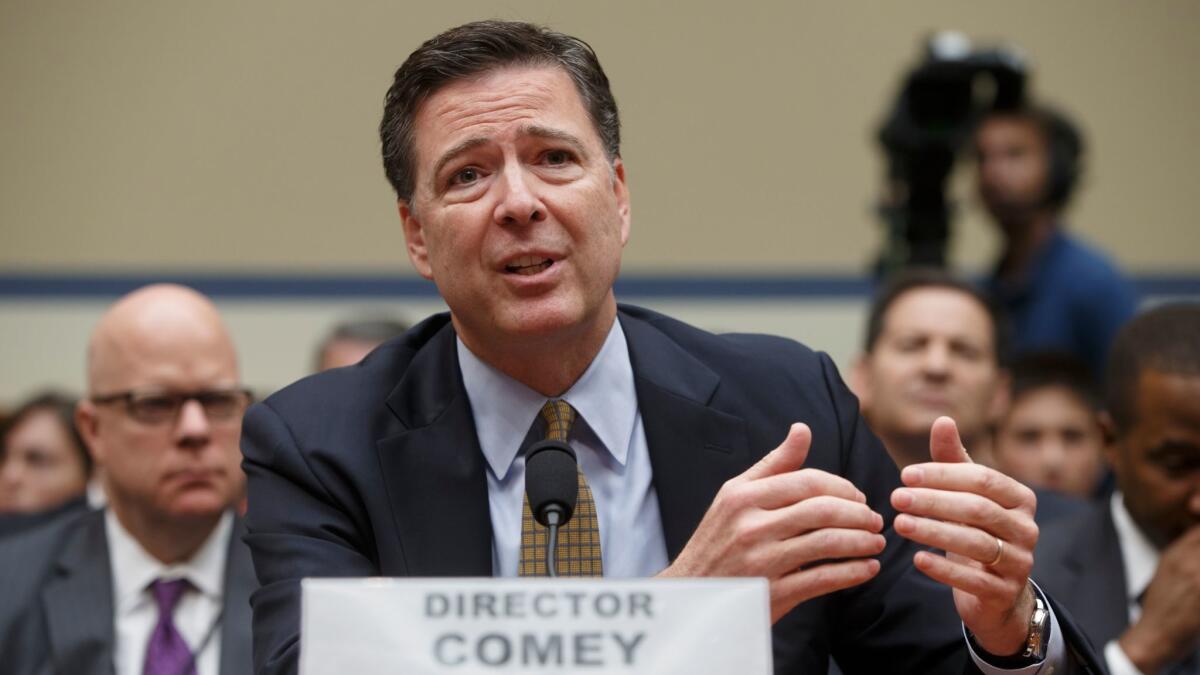Op-Ed: The somewhat independent FBI director

FBI Director James Comey testifies before the House Oversight Committee to explain his agency’s recommendation to not prosecute Hillary Clinton, on July 7.
- Share via
Is the FBI director independent of the White House? Only in a manner of speaking. Successful directors are not tools of the president, and they understand that the FBI functions best when it maintains its distance from politics. Wise presidents understand the awful optics of meddling in law enforcement decisions and thus make no move to politicize the FBI. In the end, though, the FBI director serves at the president’s pleasure.
Should Hillary Clinton be elected next week, she could in fact fire FBI Director James B. Comey as soon as she takes office in January. Many lawyers have excoriated Comey for going public on a potential new angle in the Clinton email investigation, especially within days of the election. Others have defended him. Comey’s move, said Clinton, is “not just strange, it’s unprecedented and it’s deeply troubling because voters deserve to get full and complete facts.”
But what Comey did isn’t really what’s at issue. The Constitution says Comey, like all FBI directors, is something like an “at will” employee.
There is a federal statute that provides that the director has a 10-year term, but that provision does not constrain the president’s firing power.
Yes, there is a federal statute that provides that the director has a 10-year term, but that provision does not constrain the president’s firing power, it merely limits his or her ability to keep a valued or friendly director in office after the expiration of the term. (No director can serve more than 10 years without some further legal action by the president, the Senate or Congress.)
That’s how the provision’s chief congressional sponsor, Sen. Robert Byrd (D-W. Va.), understood the statute when the 10-year term was enacted in 1976. He observed that it imposed “no limitation on the constitutional power of the president,” who can remove the FBI director “at any time, and for any reason that the president sees fit.” And it’s how the United States Court of Appeals for the District of Columbia Circuit recently interpreted the statute. The court said (albeit in passing in a decision on another issue) that, under Supreme Court precedent “such tenure provisions do not prevent the president from removing at will a director at any time during the director’s tenure.”
Byrd’s understanding, and the Court of Appeals’, is based on the constitutional principle, derived from Article II, Section 1, that the president supervises the executive branch of the government. During a debate in the 1st Congress, James Madison expressed the view that the Constitution mandated that “the first Magistrate should be responsible for the Executive department” and, by implication, that it limits Congress’s authority “to diminish or modify” such authority. Later Supreme Court cases have upheld some statutes that constrain the president’s firing authority (such statutes typically require “cause” for removal), but absent such constraints, officers in the executive branch serve at the president’s pleasure.
The president’s power in this regard is not a mere legal technicality but rather a central part of our constitutional framework. Every four years, the nation elects a chief executive, based on his or her platform, which may include promises about how the executive branch will direct its limited law enforcement resources. Those elections and promises would be a meaningless charade if an incoming president could not remove subordinates who refused to carry out the platform chosen by the people.
All that said, whatever legal discretion the president enjoys, a prudent president should remove an FBI director only for legitimate reasons. The backlash for politicizing law enforcement, or even appearing to politicize it, can be devastating. Witness the outcry and criminal investigation that arose when the George W. Bush administration removed sitting U.S. attorneys, allegedly because they pursued or failed to pursue prosecutions that met the president’s political agenda. President Nixon’s “Saturday night massacre,” in which he dismissed Watergate special prosecutor Archibald Cox, provoked similar outrage. A controversial removal of an FBI director now would prompt howls and feverish conspiracy theories.
Has Comey made decisions that warrant his dismissal? It is not for us to say, especially as neither we nor the rest of the public have all the facts. Still, based on the statements of Clinton and her supporters, it would appear that, should she be elected, his dismissal could be imminent.
On the other hand, the White House press secretary seemed to indicate that President Obama didn’t agree: “The president is completely confident that Director Comey has not taken any steps to try to intentionally influence the outcome of the election or to advantage one political party,” Josh Earnest said Monday.
If a newly installed President Clinton does remove Comey, she would be repeating history. About six months after his inauguration, President Bill Clinton concluded that then-FBI Director William S. Sessions had committed a number of ethical violations. The outgoing attorney general under the George H.W. Bush administration had accused Sessions of such lapses as taking personal trips on the FBI plane and using government money to build a security fence at his house. Bill Clinton judged that Sessions could not effectively lead the bureau.
Although the administration pushed Sessions to resign, when he didn’t and was removed, there was no significant outcry about the politicization of the FBI, which reflected an acknowledgement that the law gives the president removal authority over subordinate executive branch officers. It is a central, not incidental, constitutional principle.
Saikrishna Prakash is a professor of law and Aditya Bamzai is an associate professor of law at the University of Virginia.
Follow the Opinion section on Twitter @latimesopinion and Facebook
More to Read
A cure for the common opinion
Get thought-provoking perspectives with our weekly newsletter.
You may occasionally receive promotional content from the Los Angeles Times.









